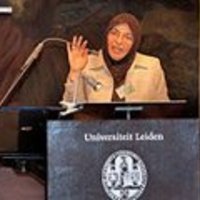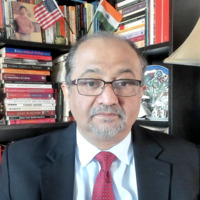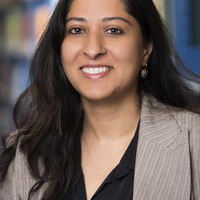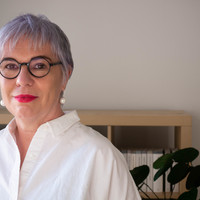
Zainab Alwani
Dr. Zainab Alwani is the Founding Director and the first Associate Professor of Islamic Studies at Howard University School of Divinity (HUSD). She is also the chair of the Master of Arts (Religious Studies) program at HUSD. Dr. Alwani received her Ph.D. in Islamic Sciences and Islamic Jurisprudence from the International Islamic University in Malaysia. Her Ph.D. dissertation focused on the implementation of the higher aims of Islamic law (Maqāṣid al Shariah) within the domain of the American Muslim family. She has authored and co-authored a wide variety of publications ranging from books, textbooks and book chapters, to scholarly articles. She is particularly interested in deriving methodologies for approaching the Qur’an, Sunna and Islamic jurisprudence in the area of women and family relations. She is currently the Editor-In-Chief of the Journal of Islamic Faith and Practice, a scholarly peer-reviewed academic journal, published by the Islamic Seminary Foundation in partnership with IUPUI University Library.
Dr. Alwani is the first female jurist to serve on the board of the Fiqh Council of North America and currently serves as the Council’s Vice-Chair. Currently, Dr. Alwani is working on a groundbreaking project regarding orphan care, the Orphan Care Project.
She is an educator with over 25 years of teaching and curriculum development experience in Islamic Studies and Arabic. She designed and developed the Master of Arts program in Islamic Studies at the HUSD and continues to reinvigorate the holistic curriculum development.
Prior to joining the School of Divinity, Dr. Alwani was the Program Director and Adjunct Professor of Arabic and Islamic Studies at the Northern Virginia Community College (NOVA), Loudoun Campus. She was also an Adjunct Professor of Arabic Studies at the School of Advanced International Studies at Johns Hopkins University. She developed courses in Arabic Studies that focused on the link between Islamic philosophy, language, and culture. She also taught Islamic history, inter-religious dialogue, and comparative religion at Wesley Theological Seminary and the Washington National Cathedral.
Some of her latest publications include: “Transformational Teaching: Prophet Muhammad (peace be upon him) as a Teacher and Murabbī.” in the Journal of Islamic Faith and Practice, Vol 2 No 2 (July, 2019). “Teaching other faiths about Islam: A transformative journey” In the special issue “Theological education between the times” of Journal Cross-Currents, June, 2019; the chapter book “With ʿĀʾisha in Mind: Reading Sūrat al-Nur through the Qur’an’s Structural Unity, 2019;” Al-waḥda al-bināʾiyya li-l-Qurʾān/ The Qur’an’s Structural Unity: A Methodology for Understanding the Qurʾān in the Modern Day, in the Journal of Islamic Faith and Practice, Vol 1 No 1 (2018); Maqāṣid Qur᾽āniyya: A Methodology on Evaluating Modern Challenges and Fiqh al-Aqalliyyāt (2014), and “Muslim Women as Religious Scholars: A Historical Survey,” in Muslima Theology: The Voices of Muslim Women Theologians.”
She is currently working on a book on the Quranic ethical model and its application to critical family issues, such as divorce and marital challenges in the Muslim American community. She is also working on a series of articles stemming from the research on the relationship between social, civil and religious law in the area of foster care, guardianship and beyond in the American context. Dr. Alwani is a mother of four, and a grandmother of six. Her hobbies include spending time with her family, reading, writing and traveling.
Dr. Alwani is the first female jurist to serve on the board of the Fiqh Council of North America and currently serves as the Council’s Vice-Chair. Currently, Dr. Alwani is working on a groundbreaking project regarding orphan care, the Orphan Care Project.
She is an educator with over 25 years of teaching and curriculum development experience in Islamic Studies and Arabic. She designed and developed the Master of Arts program in Islamic Studies at the HUSD and continues to reinvigorate the holistic curriculum development.
Prior to joining the School of Divinity, Dr. Alwani was the Program Director and Adjunct Professor of Arabic and Islamic Studies at the Northern Virginia Community College (NOVA), Loudoun Campus. She was also an Adjunct Professor of Arabic Studies at the School of Advanced International Studies at Johns Hopkins University. She developed courses in Arabic Studies that focused on the link between Islamic philosophy, language, and culture. She also taught Islamic history, inter-religious dialogue, and comparative religion at Wesley Theological Seminary and the Washington National Cathedral.
Some of her latest publications include: “Transformational Teaching: Prophet Muhammad (peace be upon him) as a Teacher and Murabbī.” in the Journal of Islamic Faith and Practice, Vol 2 No 2 (July, 2019). “Teaching other faiths about Islam: A transformative journey” In the special issue “Theological education between the times” of Journal Cross-Currents, June, 2019; the chapter book “With ʿĀʾisha in Mind: Reading Sūrat al-Nur through the Qur’an’s Structural Unity, 2019;” Al-waḥda al-bināʾiyya li-l-Qurʾān/ The Qur’an’s Structural Unity: A Methodology for Understanding the Qurʾān in the Modern Day, in the Journal of Islamic Faith and Practice, Vol 1 No 1 (2018); Maqāṣid Qur᾽āniyya: A Methodology on Evaluating Modern Challenges and Fiqh al-Aqalliyyāt (2014), and “Muslim Women as Religious Scholars: A Historical Survey,” in Muslima Theology: The Voices of Muslim Women Theologians.”
She is currently working on a book on the Quranic ethical model and its application to critical family issues, such as divorce and marital challenges in the Muslim American community. She is also working on a series of articles stemming from the research on the relationship between social, civil and religious law in the area of foster care, guardianship and beyond in the American context. Dr. Alwani is a mother of four, and a grandmother of six. Her hobbies include spending time with her family, reading, writing and traveling.
less
Related Authors
Johannes Zachhuber
University of Oxford
Muqtedar Khan
University of Delaware
Bilal Orfali
American University of Beirut
Galen Strawson
The University of Texas at Austin
Prof Attiya Waris
University of Nairobi, Kenya
Edith Szanto
University of Alabama - Tuscaloosa
Don Ross
University College Cork
Armando Salvatore
McGill University
Andrea Peto
Central European University
Martin van Bruinessen
Universiteit Utrecht
InterestsView All (158)










Uploads
Articles and Book Chapters by Zainab Alwani
Through a linguistic and thematic analysis of kafāla in the Quran, including the prophetic narratives, legal and social recommendations, and the Qur’an’s humane portrayal of the orphans, Alwani illustrates the Islamic imperative to collectively support and take care of them. She further illustrates this imperative by exploring the way Prophet Muhammad (peace be upon him) implemented these concepts among his fellow Meccans. However, Alwani argues that Muslims needs to reacquaint themselves with the Islamic tradition’s provisions of orphan kafāla, among the most important of which is that such children can never become the “children” of biologically unrelated adults. As Islam requires people to recognize the truth in all cases, such a false relationship would deprive these children of their dignity and honor and, in a sense, render them the property of biologically unrelated adults who seek to gain some benefit from them. Thus, as distinct from the American adoption system, their ties with their biological family and extended family members cannot be severed. In fact, kafāla stipulates specific roles for each family member so that a fostered child will grow up healthy in all aspects of its life – especially in terms of his/her spirituality.
In sum, this article argues that the goals of kafāla are to raise healthy, happy, and well-adjusted children who can succeed in society and benefit others. In doing so, she illustrates the parallel objectives of orphan sponsorship in Islamic law and American law, which is to secure the interests of all such children, irrespective of their religion.
Alwani ends with specific policy and community recommendations, encouraging more American Muslim families to become qualified foster families. She encourages Muslims to raise orphans communally, fully welcome them into the community, and provide needed services (e.g., transportation, tutoring in academic and life skills, and socialization), thereby making things easier for everyone involved. She urges social workers, lawyers, and other qualified individuals and organizations to acquire an accurate understanding of both foster care systems so that these children can reap the benefits.
Through a linguistic and thematic analysis of kafāla in the Quran, including the prophetic narratives, legal and social recommendations, and the Qur’an’s humane portrayal of the orphans, Alwani illustrates the Islamic imperative to collectively support and take care of them. She further illustrates this imperative by exploring the way Prophet Muhammad (peace be upon him) implemented these concepts among his fellow Meccans. However, Alwani argues that Muslims needs to reacquaint themselves with the Islamic tradition’s provisions of orphan kafāla, among the most important of which is that such children can never become the “children” of biologically unrelated adults. As Islam requires people to recognize the truth in all cases, such a false relationship would deprive these children of their dignity and honor and, in a sense, render them the property of biologically unrelated adults who seek to gain some benefit from them. Thus, as distinct from the American adoption system, their ties with their biological family and extended family members cannot be severed. In fact, kafāla stipulates specific roles for each family member so that a fostered child will grow up healthy in all aspects of its life – especially in terms of his/her spirituality.
In sum, this article argues that the goals of kafāla are to raise healthy, happy, and well-adjusted children who can succeed in society and benefit others. In doing so, she illustrates the parallel objectives of orphan sponsorship in Islamic law and American law, which is to secure the interests of all such children, irrespective of their religion.
Alwani ends with specific policy and community recommendations, encouraging more American Muslim families to become qualified foster families. She encourages Muslims to raise orphans communally, fully welcome them into the community, and provide needed services (e.g., transportation, tutoring in academic and life skills, and socialization), thereby making things easier for everyone involved. She urges social workers, lawyers, and other qualified individuals and organizations to acquire an accurate understanding of both foster care systems so that these children can reap the benefits.
It addresses the issue from the Islamic perspective. The book gives a better understanding of religious and cultural values and how they can be used as resources to prevent domestic violence, as well as emphasize that religion and culture should never be used to justify abusive behavior. The book seeks to promote attitudes and beliefs that emphasize justice, freedom and family harmony. It outlines the most promising strategies for advancing gender justice, harmonious human relations and family stability.
The editors of the Journal of Islamic Faith and Practice invite paper proposals for a unique journal on Islam and the American Muslim experience which combines intellectual rigor with community engagement. American Muslims are a diverse group in terms of religiosity, culture, race, ethnicity, education, and socioeconomic background. Muslim Americans are a population of great interest to scholars, researchers, activists, journalists and policy makers in the U.S. There have been numerous studies and research about American Muslims over recent decades. The Journal encourages proposals in all areas of studies, but the editors are particularly interested in proposals that demonstrate diverse ways of reading Islam in America through varied methodologies that explore the relationship between belief and reality. The image of Islam in America is in constant flux as new people join the community, new information becomes available, and Muslim scholars help develop appropriately contextualized interpretations of the faith and ways in which Islam can be practiced in a pluralistic society. We also encourage proposals that engage the Islamic intellectual literature of reading the Qur’ān and Sunna while seeking to analyze the U.S. reality in light of contemporary religious, ethical, and social challenges. Submissions are encouraged from social scientists, intellectuals, policymakers, and religious leaders who are aware of this religious groups’ increasing calls for greater study and research.
https://www.amazon.com/Journal-Islamic-Faith-Practice-Issue/dp/1980526761?SubscriptionId=AKIAJ2F6RDUSIYCWQMFQ&tag=sa-b2c-new-20&linkCode=xm2&camp=2025&creative=165953&creativeASIN=1980526761
Salam, and welcome to the fourth episode of our short series about Ummahat al-mu’minin, the mothers of the believers.
Through this series, I want to take you on a journey through time to learn about the mothers of the believers and so we become the best human beings, citizens of this earth, fathers/mothers, children, neighbors, colleagues and students that we can be.
In this episode, I will discuss how the Quranic framework defines the role of Umhat al Mu’mneen.
Salam, and welcome to the third episode of our short series about Ummahat al-mu’minin, the mothers of the believers.
Through this series, I want to take you on a journey through time to learn about the mothers of the believers and therefore become the best human beings, citizens of this earth, fathers/mothers, children, neighbors, colleagues and students that we can be.
https://www.youtube.com/watch?v=0R02RSzAsV8
Ummahat al-mu’minin, the mothers of the believers
First Episode
Dear Brothers and sisters, Ramadan Mubarak! And may He deepen your love and appreciation for His Prophet Muhammad, his family and his Companions all. May Allah bless, guide and strengthen each and every one of you in this blessed month of Ramadan.
Welcome to this short series about Ummahat al-mu’minin, the mothers of the believers.
Through this series, I want to take you on a journey through time to learn about the mothers of the believers and therefore become the best human beings, citizens of this earth, fathers/mothers, children, neighbors, colleagues and students that we can be.
What better time to learn about and from our mothers, who attained taqwa with direct connection with the book of Allah and Prophet Muhammad Peace be upon him, than now? We can learn so much from their experiences and stories and apply the lessons to our lives right now.
https://www.youtube.com/watch?v=2ZzHf3Fpa3M